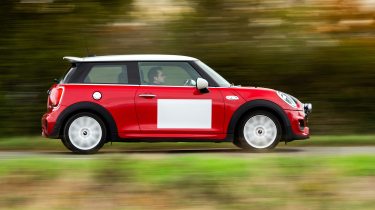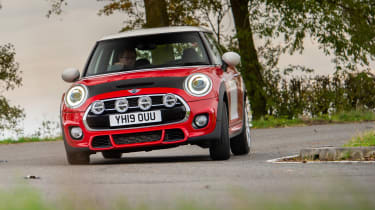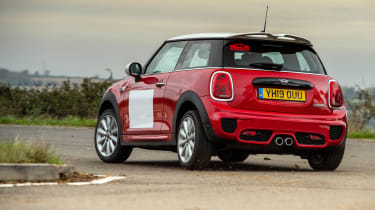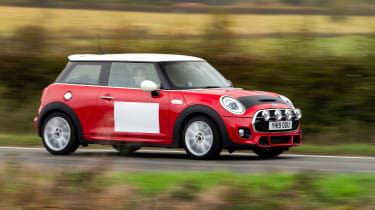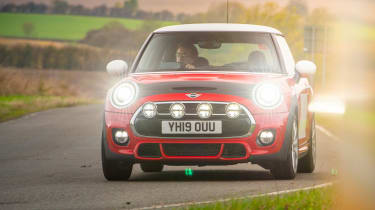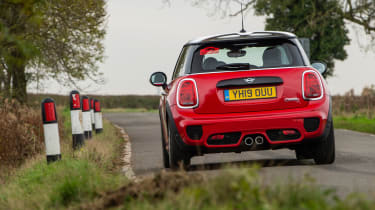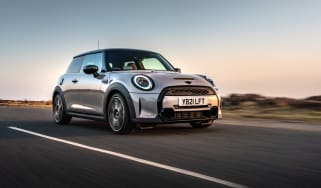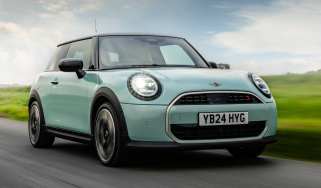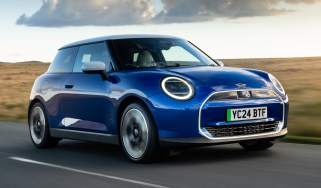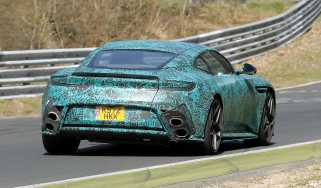Used Mini Cooper S (Mk3, F55/F56/F57, 2013-present) review and buyer’s guide
Bigger, but slightly less brawny, the third-generation Mini Cooper S is still an entertaining hot hatch
The Mini Cooper S has been with us for two decades now and has always been one of the better examples of the hot hatch genre – fun to drive, well built and a relatively painless ownership experience. The latest generation might have put on a little bit of middle-aged spread, but with a 2-litre turbocharged engine it’s still a quick machine, and despite the extra weight it’s an agile and entertaining car to drive. Some of its playfulness has been eroded over the last 20 years, but with a decent ride and good levels of equipment the Cooper S is a good all-rounder that’s still worthy of consideration.
Revealed in late 2013 with sales starting in March 2014 the Mini Cooper S was initially launched as a three-door (F56 in Mini parlance), with the larger F55 five-door model entering the market in September 2014. The last model, the Convertible (F57), made its debut in 2015. The Cooper S was, to start with, the top dog in the Mini line-up, but it was soon eclipsed by the John Cooper Works (JCW) models which offered considerably more performance.
> BMW to reboot Mini for the electric age – first bespoke EV coming in early 2023
The major update for this generation of Cooper S occurred early in 2018 when the facelifted Mini was launched. There were the expected minor styling tweaks along with LED lights front and rear, touchscreen navigation with Apple CarPlay, some additional equipment and new upholstery finishes. Mechanically it remained the same bar the automatic gearbox, which was upgraded from a six-speed torque converter unit to a seven-speed DCT.
Later in 2018 the Mini range changed its model designation and the Cooper S could now be purchased in two different trim levels – Sport and Exclusive, with the former boasting plenty of JCW additions while the latter was rather more luxurious. There was a further facelift in early 2021 with some more tweaks to the styling, new colours and some additional equipment. Oddly, the Cooper S lost some of its power along the way with the 2-litre engine now developing 176bhp as opposed to the earlier car’s 189bhp, but according to Mini its 0-62mph acceleration time was unaffected.
Prices, specs and rivals
The Mini Cooper S started off life back in 2014 with a list price of £18,650, which had swelled to £24,455 by 2021, with both those prices being for the three-door version. In the hot hatch class it doesn’t really have too many direct rivals. For something a little less refined there’s Abarth’s range of bonkers 595 and 695 models, but they’re far less practical and not as well built as the Mini.
The Suzuki Swift Sport is a little cheaper, and while it’s an entertaining steer it can’t hold a candle to the Mini’s image. A more recent addition to the class is Hyundai’s excellent i20 N, which is a more involving drive. The Cooper S’s main rival though is the Ford Fiesta ST, which is more powerful and a sharper car to drive.
Review
Engine, gearbox and technical highlights
The Cooper S bucks the current trend for downsized engines and where most rivals have opted for three cylinders the Mini uses a 2-litre four-cylinder unit. It’s the BMW/Mini B48 modular engine that’s used in a wide range of the company’s product portfolio and can even be found in the entry-level Toyota Supra.
There’s nothing desperately wrong with its numbers either, developing 189bhp at 4700rpm and a useful 221lb ft of torque available from a lowly 1250rpm all the way through to 4500rpm. Three transmissions have been used – a six-speed manual and two autos, the first being a six-speed torque converter type, which was superseded by a seven-speed DCT in 2018.
Performance and 0-60 time
The Cooper S is reasonably rapid with 0-62mph taking 6.8sec for the manual three-door, 6.9sec for the five-door and 7.2sec for the Convertible. Vital stats for the automatic models are broadly similar. Top speeds range from 143mph for the Convertible to 146mph for the manual. On the road the hot Minis feel suitably brisk, but they’re a little lacking in drama as there’s no step in the power delivery, mainly thanks to the flat and broad torque output. It’s not the most aurally stimulating power unit either, so you won’t regularly visit the red line just for the thrill of it.
Ride and handling
This generation of Cooper S continues the model’s tendency for putting a smile on the driver’s face with a good blend of agility, responsiveness and decent ride quality. The steering is very quick, giving the Mini a pointy feeling that makes it a delight on the UK’s B-road network. Decent body control encourages you to push on, and while it might lack the ultimate levels of interaction provided by a Fiesta ST the Mini is still one of the better supermini-sized hot hatches currently on sale.
MPG and running costs
Depending on the precise model, official mpg figures tend to hover around the mid-40s, with the most common three-door hatch recording a 43.5mpg combined figure. If you’re enjoying a spirited drive you could expect this to drop quite dramatically, but in day-to-day running you shouldn’t be that far off the official figures unless you do a significant number of miles in built-up areas.
CO2 figures average around the 140g/km mark depending on model and transmission, so first-year VED would be £220 and £155 each subsequent year. Mini’s fixed-price servicing can be transferred between owners and equates to lower running costs, but standard servicing shouldn’t break the bank, while consumables such as tyres will likely cost around £450 for a set of four depending on wheel size.
Interior and tech
The Cooper S is unusual in that buyers have a choice of three body styles – three-door, five-door and convertible. The three-door is fine if you don’t have much call for rear-seat occupants, but the five-door with its additional 72mm of rear legroom will see less complaints from those sitting in the back. The five-door has a boot that’s bigger too, but at 278 litres it’s nothing to write home about.
The Mini still harks back to the past with its retro interior styling, but some aspects are perhaps a little naff, and the oblong central display does look a little out of place in the circular central ‘dial’. As you’d expect from a BMW Group company the Mini offers plenty of tech, with the vast majority of it being useful rather than frivolous.
Design
While the Mini is still instantly recognisable – there’s nothing on the market that you could mistake it for – it has grown in recent years and looks a trifle bulbous from some angles. The five-door in particular looks a little ungainly, but that’s the price you pay for added practicality.
There are a bewildering number of personalisation options – colours, decals, wheels, trim finishes and various option packs – and Mini reckons that the likelihood of two identical Minis being ordered are pretty slim.
Buyer’s guide
Prices
Minis in general fare pretty well as far as depreciation is concerned and retain their value better than many other brands. The Cooper S does depreciate slightly quicker than some of the more mundane models, but you’re unlikely to find a real bargain. Do look out for models that were originally ordered with lots of kit as expensive options never retain their value well, making these cars more attractive as a used purchase.
Range, specifications and options
The Cooper S range hasn’t changed that significantly during its lifetime – all models in this generation have been powered by the same B48 engine and there’s no change in performance between an early car and the latest versions.
From 2018 onwards the change to Classic, Sport and Exclusive trim levels does give a fair bit of differentiation between cars, with the Sport and its selection of JCW goodies appealing most to the keen driver.
All models have air conditioning, an on-board computer, Bluetooth and a USB interface, while later cars added LED lights, a standard-fit infotainment screen (either 6.5- or 8.8-inch depending on model), cruise control and Apple CarPlay. The options list is extensive and includes items such as satnav, park distance control, upgraded stereos and even a heated steering wheel. We’d be tempted to stick to a relatively simple specification as there will be less to go wrong.
Problems and checks
Mini has a relatively good reputation for reliability and there aren’t too many Achilles heels on the Cooper S. Some owners have reported high oil consumption, particularly when the cars are driven hard, and rocker cover gaskets can leak. Servicing schedules need to be adhered to, as stretched oil change intervals will lead to premature engine wear.
Clutches on manual cars can be a little fragile, but a less than precise gear change can also be down to faulty linkages.
Recalls
2018: Spare wheel may become loose on cars made between December 2013 and October 2014.
2018: Front seat backrest may not fully engage on cars built during August and September 2014.
